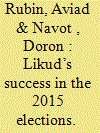| Srl | Item |
| 1 |
ID:
116183


|
|
|
|
|
| Publication |
2012.
|
| Summary/Abstract |
Israel is one of the only countries whose existence is openly called into question. There are a number of contemporary threats that could bring an end to Israel as a Jewish democracy. They include 'hard' threats of nuclear destruction and conventional invasion and 'soft' threats of an emerging Arab majority and elite actions to end Israel either as a Jewish state or as a democratic state. Israeli policymakers can learn how to cope with these threats by examining how Israel was destroyed in ancient times. Israel's destruction at the hands of the Assyrians, Babylonians, and Romans reinforces Realist lessons for contemporary Israel. They include the dangers of relying on outside allies for support, the need to prevent adversaries from gaining the capability to destroy you, the risks of an unfavourable demographic balance, and how internal conflict can bring about one's demise. Although appeasement proved to be the preferred policy for some of Israel's ancient forebears, the total threat posed by some of modern Israel's adversaries and Israel's contemporary ability to overpower its regional foes require substantial modification before such an approach should be considered today.
|
|
|
|
|
|
|
|
|
|
|
|
|
|
|
|
| 2 |
ID:
149186


|
|
|
|
|
| Summary/Abstract |
The current article develops an explanation for Likud’s success, which goes beyond the existing structural and circumstantial accounts. It argues that Likud’s success should be sought for in the utilization of Hobbesian logic by its leader, Benjamin Netanyahu. By revealing the commonalities between Hobbes’s political thinking and Rhetoric, and Netanyahu’s political conduct, this paper sheds new light on Netanyahu’s leadership and sources of legitimation and authority in Israel, which are understudied. We demonstrate that Netanyahu’s Hobbesian dimension is best reflected in his understanding of the nature of civil and political rights in the context of an ongoing struggle for survival and self-determination.
|
|
|
|
|
|
|
|
|
|
|
|
|
|
|
|
| 3 |
ID:
089013


|
|
|